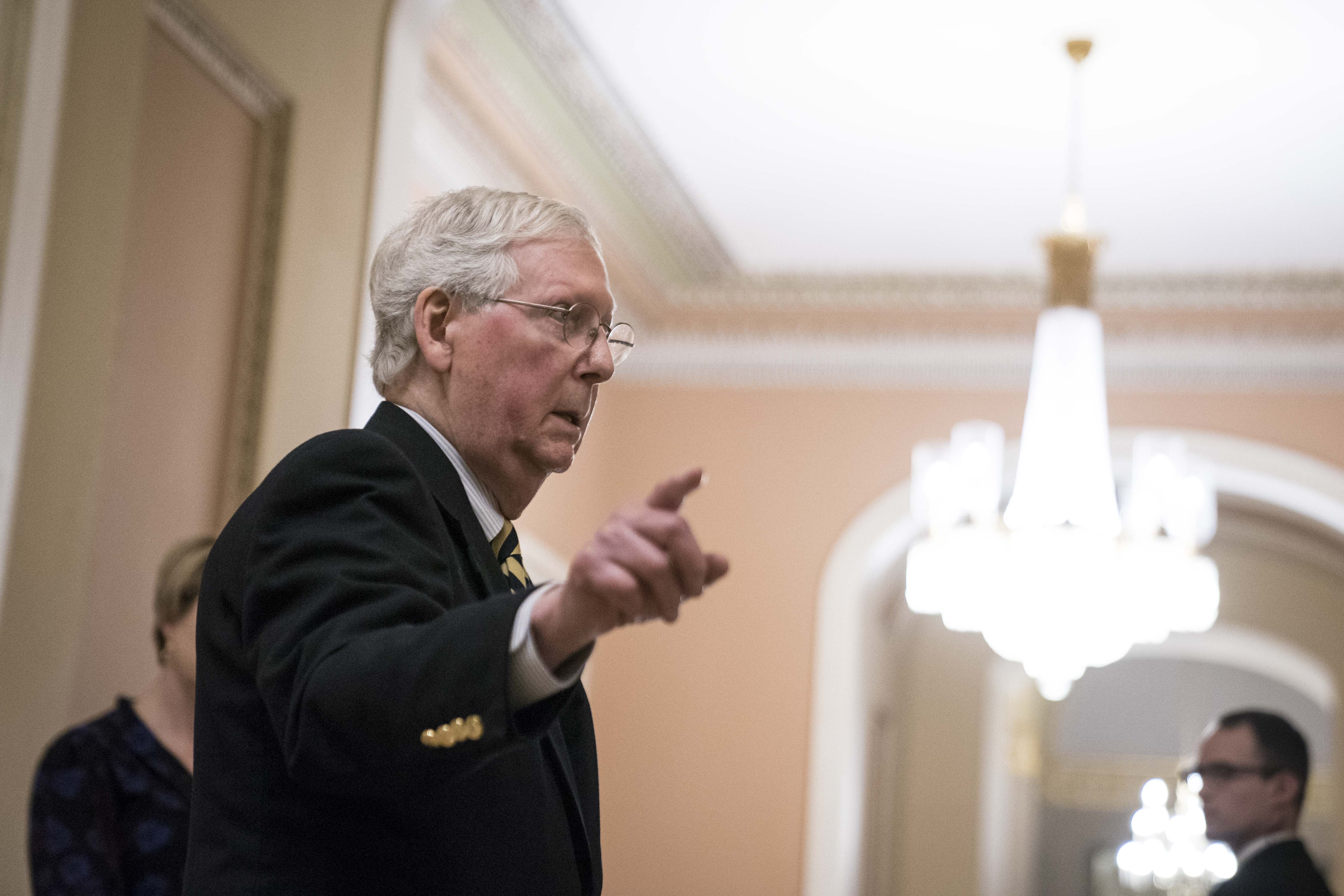Senate Majority Leader Mitch McConnell, a Republican from Kentucky, left, speaks to members of the media in the U.S. Capitol in Washington, D.C., on Sunday, March 22, 2020.
Sarah Silbiger | Bloomberg | Getty Images
Democrats and Republicans on Monday continued negotiations over a massive stimulus funding package that failed to get enough votes in a key Senate procedural tally Sunday evening.
The measure, however, again failed a key procedural vote in the Senate on Monday afternoon, after Senate Minority Leader Chuck Schumer warned a deal would not pass until Republicans agreed to key changes. He said that negotiations would continue even while the Senate took the procedural vote.
Senate Democrats have criticized the $500 billion fund that the Republican proposal sets aside for distressed businesses, calling it a bailout fund “with no strings attached.” Democrats are also seeking enhanced unemployment measures and protections for workers. GOP lawmakers slammed Democrats for seeking climate provisions within the measure, as well. House Speaker Nancy Pelosi floated her own proposal for a stimulus bill Monday.
Schumer, nonetheless, said the two parties had come to certain agreements about revisions to the Republicans’ bill, including adding more unemployment protections and adding more money to hospitals. He said the Democrats are “fighting hard and making progress” on more funding for state and local governments.
“We’re very close to reaching a deal. Very close. And our goal is to reach a deal today,” he said. “And we’re hopeful, even confident that we will meet that goal.”
Stocks cut their losses on Schumer’s optimistic words. The Dow Jones industrial average at one point traded more than 900 points lower, giving away all of its gains since Trump’s election. Markets, however, turned lower again after the bill failed to clear the procedural hurdle.
Both sides have felt the pressure to pass what may be one of the biggest packages ever, while still protecting their parties’ interests.
McConnell threw aside his usually placid appearance as he tore into Senate Democrats for the second straight day on Monday, accusing them of filibustering a deal the country needs immediately.
Even talks to hash out a voting schedule turned combative. As Schumer objected to efforts by Sen. Susan Collins, R-Maine, to speak, she retorted, “This is unbelievable.”
When the second cloture vote failed to pass, as Sen. Schumer warned, McConnell again unleashed anger, accusing Democrats of adding to their wish list, rather than focusing on getting a deal out fast.
The Trump administration and Congress are eager to halt the crushing economic impact of the coronavirus and the uncertainty it has caused investors. The Federal Reserve said Monday it will launch a barrage of programs to help the markets, including an open-ended asset purchase program and moving into corporate bonds for the first time.
Treasury Secretary Steven Mnuchin told CNBC on Monday that Congress is “very close” to a stimulus agreement and must get it done “today.”
President Donald Trump, in a series of tweets Sunday night and Monday morning, signaled resistance to continuing stay-at-home guidelines for more than 15 days − and an urge to return to normalcy. “WE CANNOT LET THE CURE BE WORSE THAN THE PROBLEM ITSELF,” the president wrote.
The final Sunday night Senate vote on whether to advance the legislation was 47-47, well short of the 60 votes needed, after Democrats laid out a number of objections to the Republican proposal. Those issues included what Democrats said was a lack of protection for workers and sufficient funding for hospitals. They took aim at a $500 billion fund to support “severely distressed business,” arguing it allowed too much control to the Treasury.
Mnuchin said the Federal Reserve can leverage that fund to offer more than $4 trillion in support to U.S. businesses.
The fund allocates $58 billion for passenger and cargo airlines and $17 billion for businesses critical to maintaining national security. It leaves the rest open to businesses, states and municipalities. Companies from hotels to restaurants to manufacturers have argued the coronavirus has pummeled their business, and they need government aid just to stay afloat.
The proposed bill gave considerable authority to the Treasury to implement the fund, including discerning which parties receive money. It did offer concessions to Democrats like a ban on stock buybacks for companies that receive federal aid while a loan is outstanding, and maintaining payroll “to the extent practicable.”
Some Democrats, though, worried those stipulations weren’t strong enough. One Democratic aide said opponents believe the bill gave Treasury the power to waive the ban on buybacks.
The proposed bill also limited compensation at companies that receive financial assistance from the fund for executives who received more than $425,000 in total compensation in 2019. Those executives may not make more for the next two years than they did last year, it said. Some Democrats have sought stricter rules around compensation.
One potential solution to what Democrats say is a lack of fund oversight could be an inspector general to oversee it, one of the sources said. A Democratic aide said he could not confirm whether the party is pushing to add an inspector general, but noted the party is “fighting for transparency and accountability and restrictions on it.”
A Senate GOP aide said other hangups included Democrats seeking more bargaining power for unions, increased fuel emissions standards for airlines and an expansion of wind and solar tax credits. A spokesperson for Schumer did not immediately respond to a request for comment.
Meantime, airlines also expressed discontent over the proposal. The industry has sought relief in the form of cash grants and loans, but the $500 billion fund only offered loans and guarantees.
The language proposed by Republicans leaves open the structure of the loans. National Economic Council Director Larry Kudlow said Monday he “personally likes” the “taxpayer taking a piece of equity” in government loans.
Still, there may be other ways the government could help bridge the divide, like offering airlines zero-interest loans, or loan forgiveness if they fulfill certain obligations, such as maintaining payroll.
This is a developing story. Check back for updates.
















